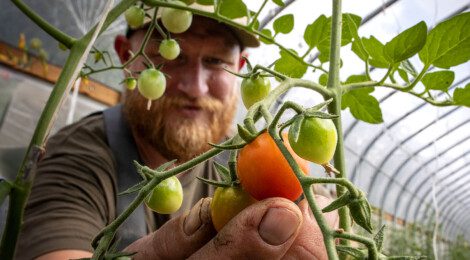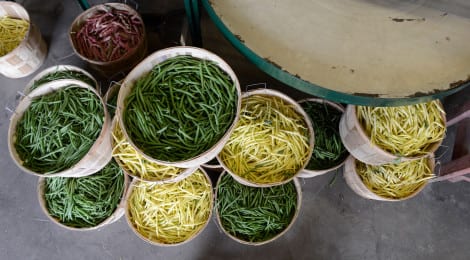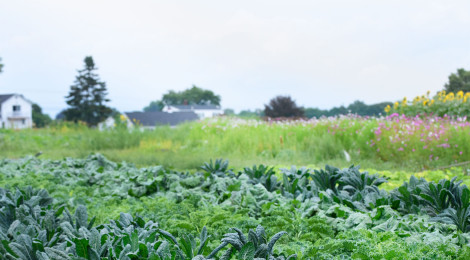
HPKF News The Kendall Foundation’s Response to Covid-19
On March 27, 2020, the Henry P. Kendall Foundation announced the suspension of the remainder of our 2020 programs in order to refocus our efforts and resources in collaboration with others in ways that could minimize the negative impacts that COVID-19 is having on the regional food system.
The Next Phase of the New England Food System Resilience Fund
On November 9, 2020, the Henry P. Kendall Foundation, the John Merck Fund, and partner foundations, The 1772 Foundation, The Sandy River Charitable Foundation and The Harvard Pilgrim Health Care Foundation announced the next phase of an effort that began in March 2020. The New England Food System Resilience Fund (Resilience Fund) initially was launched to reinforce, restore, and promote the resilience of the regional food system amidst the COVID-19 pandemic. The next phase of that effort included the transfer of those funds to The New England Grassroots Environment Fund, Inc. (Grassroots Fund), which has assumed management of the effort and expanded its area of focus to include racial equity.
Established in March 2020, The New England Food System Resilience Fund is a joint philanthropic effort designed to reinforce, restore, and promote the resilience of the regional food system in a time of unprecedented disruption resulting from the COVID-19 pandemic. In April 2020, with help from a volunteer review panel of eight food systems experts from around the region, the Resilience Fund made eleven first-round “Reinforcement” grants totaling just under $350,000. Overall, $1 million has been raised for the Resilience Fund from five foundations and fundraising continues.
George Floyd’s murder just one month after the initial round of grants and the ensuing national reckoning with racial injustice prompted leaders of the John Merck Fund and the Henry P. Kendall Foundation to reconsider the Resilience Fund as a potential vehicle to not only respond to the ongoing pandemic but also to acknowledge and begin to address the many racial inequities in both the current food system and in philanthropic practices. Further, they recognized that the Grassroots Fund holds the expertise and participatory grantmaking practices necessary to carry this important work forward through a racial equity lens.
The Resilience Fund’s remaining balance of $650,000 has come under the management of the Grassroots Fund, while fundraising continues. The Grassroots Fund’s participatory process uses an open call for application readers and works with a grantmaking committee to make final decisions on resource allocations. Through self-identified demographic data from participants, the Grassroots Fund intentionally brings together groups with diverse lived experiences and builds skills around bias in decision-making, white supremacy culture, and system change.
Through the winter 2020-2021, the Grassroots Fund, in partnership with consultants at KarenKarp&Partners, worked on co-creating a landscape analysis of the Northeast food systems with input from frontline organizers, nonprofit colleagues and foundation partners. A steering committee will use this analysis to design grant program priorities, guidelines and application process. The first round of grantmaking is anticipated for Spring 2021 with a goal of distributing up to $400,000 annually to support a just, resilient, equitable food system.
The boards of The John Merck Fund, The Henry P. Kendall Foundation and The New England Grassroots Environment Fund have approved the plan.
March 2020 COVID-19 Response Grants
As a first step towards that effort, our Board of Trustees approved the following commitments:
- A $350,000 grant to the Boston Public Market to provide working capital and some immediate relief during the COVID-19 crisis. Since opening in 2015, the Boston Public Market has connected more than ten million visitors to food products grown, harvested, and hand-crafted in New England.
- A $250,000 grant to the John Merck Fund, who, together with the 1772 Foundation, the Sandy River Charitable Foundation, and others, have established the New England Food System Resilience Fund, designed to reinforce, restore, and promote the resilience of the regional food system in a time of unprecedented disruption.
- A $150,000 grant to CommonWealth Kitchen to provide working capital and some immediate relief during the COVID-19 crisis. Since opening in 2014, CommonWealth Kitchen has helped launch more than 200 food businesses, employing almost 600 people, and generating more than $50 million in annual revenue.
- A $100,000 grant to Coastal Enterprises, Inc. to provide immediate debt relief to its portfolio of more than 40 farm loans. These funds will provide three months of debt relief to farms and help them address new market realities brought on by the pandemic.
This represents an initial set of grants intended to help stabilize the regional food system and ultimately help food producers recover from this crisis. Given the uncertain and fast-moving nature of the crisis, our commitments and focus will shift over time. We will closely monitor the ongoing impacts of COVID-19 on the regional food system and respond where and when we can have the greatest impact.
On March 27, 2020, the Henry P. Kendall Foundation announced the suspension of the remainder of our 2020 programs in order to refocus our efforts and resources in collaboration with others in ways that could minimize the negative impacts that COVID-19 is having on the regional food system.
The Next Phase of the New England Food System Resilience Fund
On November 9, 2020, the Henry P. Kendall Foundation, the John Merck Fund, and partner foundations, The 1772 Foundation, The Sandy River Charitable Foundation and The Harvard Pilgrim Health Care Foundation announced the next phase of an effort that began in March 2020. The New England Food System Resilience Fund (Resilience Fund) initially was launched to reinforce, restore, and promote the resilience of the regional food system amidst the COVID-19 pandemic. The next phase of that effort included the transfer of those funds to The New England Grassroots Environment Fund, Inc. (Grassroots Fund), which has assumed management of the effort and expanded its area of focus to include racial equity.
Established in March 2020, The New England Food System Resilience Fund is a joint philanthropic effort designed to reinforce, restore, and promote the resilience of the regional food system in a time of unprecedented disruption resulting from the COVID-19 pandemic. In April 2020, with help from a volunteer review panel of eight food systems experts from around the region, the Resilience Fund made eleven first-round “Reinforcement” grants totaling just under $350,000. Overall, $1 million has been raised for the Resilience Fund from five foundations and fundraising continues.
George Floyd’s murder just one month after the initial round of grants and the ensuing national reckoning with racial injustice prompted leaders of the John Merck Fund and the Henry P. Kendall Foundation to reconsider the Resilience Fund as a potential vehicle to not only respond to the ongoing pandemic but also to acknowledge and begin to address the many racial inequities in both the current food system and in philanthropic practices. Further, they recognized that the Grassroots Fund holds the expertise and participatory grantmaking practices necessary to carry this important work forward through a racial equity lens.
The Resilience Fund’s remaining balance of $650,000 has come under the management of the Grassroots Fund, while fundraising continues. The Grassroots Fund’s participatory process uses an open call for application readers and works with a grantmaking committee to make final decisions on resource allocations. Through self-identified demographic data from participants, the Grassroots Fund intentionally brings together groups with diverse lived experiences and builds skills around bias in decision-making, white supremacy culture, and system change.
Through the winter 2020-2021, the Grassroots Fund, in partnership with consultants at KarenKarp&Partners, worked on co-creating a landscape analysis of the Northeast food systems with input from frontline organizers, nonprofit colleagues and foundation partners. A steering committee will use this analysis to design grant program priorities, guidelines and application process. The first round of grantmaking is anticipated for Spring 2021 with a goal of distributing up to $400,000 annually to support a just, resilient, equitable food system.
The boards of The John Merck Fund, The Henry P. Kendall Foundation and The New England Grassroots Environment Fund have approved the plan.
March 2020 COVID-19 Response Grants
As a first step towards that effort, our Board of Trustees approved the following commitments:
- A $350,000 grant to the Boston Public Market to provide working capital and some immediate relief during the COVID-19 crisis. Since opening in 2015, the Boston Public Market has connected more than ten million visitors to food products grown, harvested, and hand-crafted in New England.
- A $250,000 grant to the John Merck Fund, who, together with the 1772 Foundation, the Sandy River Charitable Foundation, and others, have established the New England Food System Resilience Fund, designed to reinforce, restore, and promote the resilience of the regional food system in a time of unprecedented disruption.
- A $150,000 grant to CommonWealth Kitchen to provide working capital and some immediate relief during the COVID-19 crisis. Since opening in 2014, CommonWealth Kitchen has helped launch more than 200 food businesses, employing almost 600 people, and generating more than $50 million in annual revenue.
- A $100,000 grant to Coastal Enterprises, Inc. to provide immediate debt relief to its portfolio of more than 40 farm loans. These funds will provide three months of debt relief to farms and help them address new market realities brought on by the pandemic.
This represents an initial set of grants intended to help stabilize the regional food system and ultimately help food producers recover from this crisis. Given the uncertain and fast-moving nature of the crisis, our commitments and focus will shift over time. We will closely monitor the ongoing impacts of COVID-19 on the regional food system and respond where and when we can have the greatest impact.


